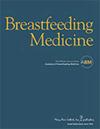The Association Between Maternal Psychological Health and Human Milk Oligosaccharide Composition.
IF 2.1
3区 医学
Q2 OBSTETRICS & GYNECOLOGY
引用次数: 0
Abstract
Background and Objective: Human milk oligosaccharides (HMOs) are carbohydrates abundant in human breast milk. Their composition varies widely among women, and prior research has identified numerous factors contributing to this variation. However, the relationship between maternal psychological health and HMO levels is currently unknown. Thus, our objective was to identify whether maternal stress, anxiety, or depressive symptoms are associated with HMOs. Methods: Data originated from 926 lactating individuals from the UC San Diego Human Milk Biorepository. Nineteen prevalent HMOs were assayed using high-performance liquid chromatography. Participants self-reported measures of the Edinburgh Postnatal Depression Scale (n = 495), State-Trait Anxiety Inventory S-Scale (n = 486), and/or Perceived Stress Scale (n = 493) within 60 days of their milk collection; their results were categorized using standard screening cutoffs. HMOs were assessed individually and grouped by principal component analysis (PCA), and associations with maternal psychological symptoms were analyzed using multivariable linear regression adjusted for covariates. Results: After Bonferroni correction (p < 0.002), the following HMOs significantly varied with maternal psychological distress in multivariate analysis: lacto-N-fucopentaose III (LNFP III) and lacto-N-hexaose (LNH) among Secretors with depressive symptoms and difucosyllactose (DFLac), LNFP III, and disialyl-LNH (DSLNH) among Secretors with stress. In PCA, depressive symptoms and stress were associated with one principal component among Secretors. No HMOs varied with anxiety symptoms. Conclusions: Several HMOs varied with maternal depressive symptoms and stress, suggesting a relationship between maternal psychological health and breast milk composition. Additional studies are needed to determine the impact of this variation on infant health.产妇心理健康与母乳低聚糖成分之间的关系
背景和目的:母乳低聚糖(HMOs)是母乳中含量丰富的碳水化合物。其成分在不同的妇女中差异很大,先前的研究已经发现了导致这种差异的多种因素。然而,目前尚不清楚产妇心理健康与 HMO 水平之间的关系。因此,我们的目标是确定产妇的压力、焦虑或抑郁症状是否与 HMOs 有关。研究方法数据来源于加州大学圣地亚哥分校母乳生物库中的 926 名哺乳期妇女。采用高效液相色谱法检测了 19 种流行的 HMOs。参与者在采集母乳后 60 天内自我报告了爱丁堡产后抑郁量表(495 人)、状态-特质焦虑量表 S 量表(486 人)和/或感知压力量表(493 人)的测量结果;他们的结果按照标准筛查临界值进行了分类。对 HMO 进行单独评估,并通过主成分分析 (PCA) 进行分组,使用多变量线性回归分析与产妇心理症状的关系,并对协变量进行调整。结果经过 Bonferroni 校正(p < 0.002)后,在多变量分析中,以下 HMO 与产妇心理压力有显著差异:有抑郁症状的 Secretor 中有乳-N-岩藻糖 III (LNFP III) 和乳-N-六糖 (LNH),有压力的 Secretor 中有二ucosyllactose (DFLac)、LNFP III 和二ialyl-LNH (DSLNH)。在 PCA 中,秘书的抑郁症状和压力与一个主成分相关。没有 HMOs 与焦虑症状相关。结论一些 HMO 与产妇抑郁症状和压力有关,表明产妇心理健康与母乳成分之间存在关系。要确定这种变化对婴儿健康的影响,还需要进行更多的研究。
本文章由计算机程序翻译,如有差异,请以英文原文为准。
求助全文
约1分钟内获得全文
求助全文
来源期刊

Breastfeeding Medicine
OBSTETRICS & GYNECOLOGY-PEDIATRICS
CiteScore
4.20
自引率
11.10%
发文量
130
审稿时长
6-12 weeks
期刊介绍:
Breastfeeding Medicine provides unparalleled peer-reviewed research, protocols, and clinical applications to ensure optimal care for mother and infant. The Journal answers the growing demand for evidence-based research and explores the immediate and long-term outcomes of breastfeeding, including its epidemiologic, physiologic, and psychological benefits. It is the exclusive source of the Academy of Breastfeeding Medicine protocols.
Breastfeeding Medicine coverage includes:
Breastfeeding recommendations and protocols
Health consequences of artificial feeding
Physiology of lactation and biochemistry of breast milk
Optimal nutrition for the breastfeeding mother
Breastfeeding indications and contraindications
Managing breastfeeding discomfort, pain, and other complications
Breastfeeding the premature or sick infant
Breastfeeding in the chronically ill mother
Management of the breastfeeding mother on medication
Infectious disease transmission through breast milk and breastfeeding
The collection and storage of human milk and human milk banking
Measuring the impact of being a “baby-friendly” hospital
Cultural competence and cultural sensitivity
International public health issues including social and economic issues.
 求助内容:
求助内容: 应助结果提醒方式:
应助结果提醒方式:


